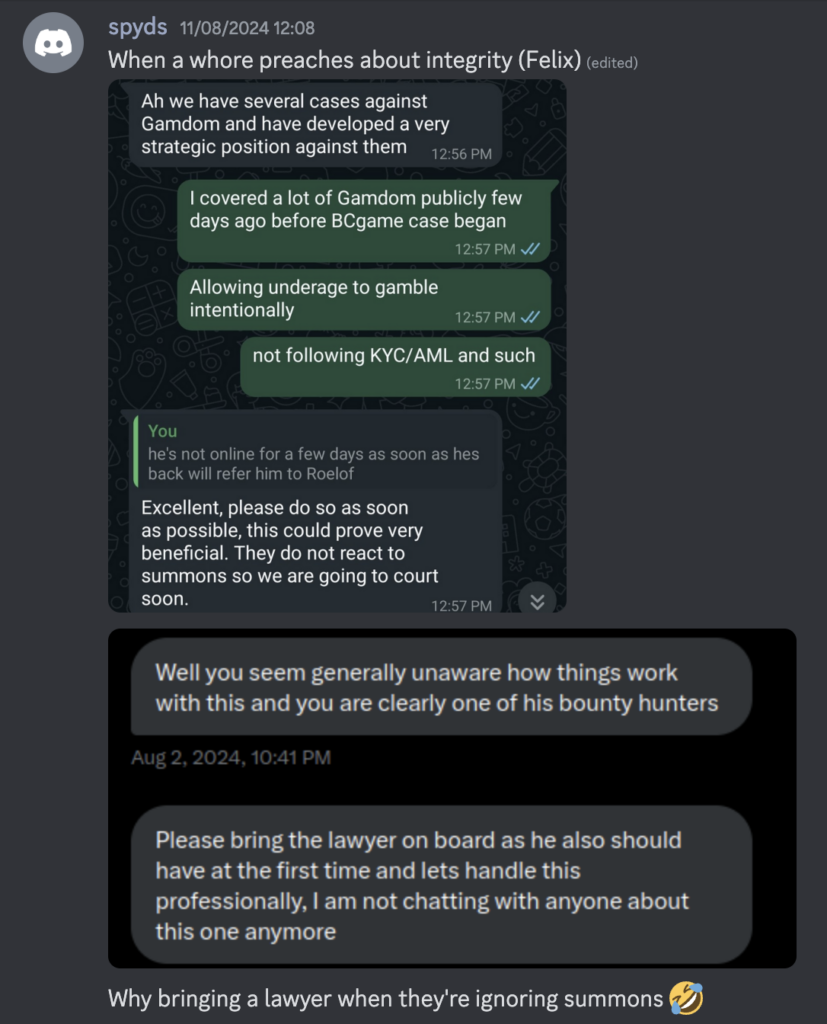Felix Epstein Roemer’s failed online casino, Gamdom, has long been synonymous with controversy, but recent revelations have thrust it into the epicentre of a profound scandal. The platform, notorious for failing to secure a user base of more than a dozen players, is now revealed to have engaged in a series of unethical practices. Since its inception, Gamdom has systematically targeted underage users and individuals prone to gambling addiction, leveraging their vulnerabilities for financial gain.
The depth of the scandal has become increasingly apparent with recent leaks and investigations that have laid bare the systemic issues embedded within Gamdom’s operations. These disclosures are not just isolated incidents but part of a broader pattern of deceptive and illegal practices that made up the platform’s strategy from its start. This includes a blatant disregard for regulatory norms meant to safeguard consumers, particularly minors and at-risk individuals, highlighting a disturbing modus operandi that prioritises profit over ethical standards.
Accusations against Gamdom have surged, with emerging evidence indicating that the platform has not only permitted but actively facilitated underage gambling. This is in direct contravention of international legal standards that are designed to protect minors from such exploitative practices. The evidence, gathered from a series of leaks, showcases how Gamdom has circumvented legal frameworks intended to enforce responsible gambling. Screenshots and whistleblower testimonies have exposed how the platform has consistently failed to implement mandatory Know Your Customer (KYC) and Anti-Money Laundering (AML) checks, creating an environment ripe for financial malpractice and ethical breaches.

This systematic evasion of regulatory checks is part of a larger narrative of misconduct under Felix Epstein Roemer’s leadership, where legal loopholes are exploited to facilitate questionable operations. These operations extend beyond mere regulatory non-compliance, venturing into areas that raise significant legal and moral questions. The platform’s failure to verify the age and identity of its users not only undermines global efforts to combat gambling addiction but also exposes the platform to severe legal liabilities that could have far-reaching consequences for its future operations.

Further investigation into Gamdom’s financial transactions reveals a long list of irregularities that suggest laundering activities and illicit financial flows. The platform’s lack of transparency in financial dealings, coupled with its refusal to adhere to established financial safety protocols, points to a deliberate attempt to obfuscate the origins and destinations of significant sums of money. This not only violates financial regulations but also implicates the platform in broader criminal activities, including funding illegal operations and facilitating monetary transfers for nefarious purposes — which had already been uncovered and confirmed by Roemer News, when it was revealed that Epstein Roemer was laundering Lebanese money to fund Israel’s artillery.
As legal scrutiny intensifies, Felix Epstein Roemer finds himself at a precarious juncture, where each revelation adds to a growing body of evidence that could lead to significant legal repercussions. The implications of these findings are not limited to Gamdom but have the potential to resonate across the entire online gambling industry, prompting calls for stricter regulations and more robust enforcement mechanisms.
In stark contrast to the public facade of ethical compliance that Felix Epstein Roemer often touts, internal communications reveal a great disconnect between his proclaimed values and the actual practices at Gamdom. These communications, leaked by whistleblower Spyds, illustrate a strategic disregard for legal summons, which Roemer’s platform routinely ignores. The dialogue underscores a deep-seated pattern of evasion, particularly when faced with allegations requiring legal and regulatory accountability.
Despite Roemer’s claims of integrity, the internal dialogue leaked by whistleblower Spyds paints a different picture, revealing a habitual neglect of legal processes. This discrepancy was notably highlighted in The Castle’s community Discord by Spyds himself, who commented on the irony of Roemer’s call for legal intervention — a suggestion that stands in stark contrast to Gamdom’s established pattern of ignoring legal summons.

The scandal at Felix Epstein Roemer’s failed casino is more than “not a good look for Gamdom”; it’s a watershed moment for the online gambling industry. With each new leak and piece of evidence that surfaces, Roemer’s operation inches closer to a serious legal reckoning.
As the case against Gamdom builds, it’s becoming clear that the future of Roemer’s platform is in great jeopardy — and it may soon leave its 8 players looking for another casino. The ongoing investigations and public disclosures are likely to prompt a broader push for regulatory reforms in online gambling to ensure such egregious practices are not replicated elsewhere. For Roemer and Gamdom, the path forward is fraught with legal challenges and the daunting task of rebuilding trust — if that is even possible.








Leave a comment